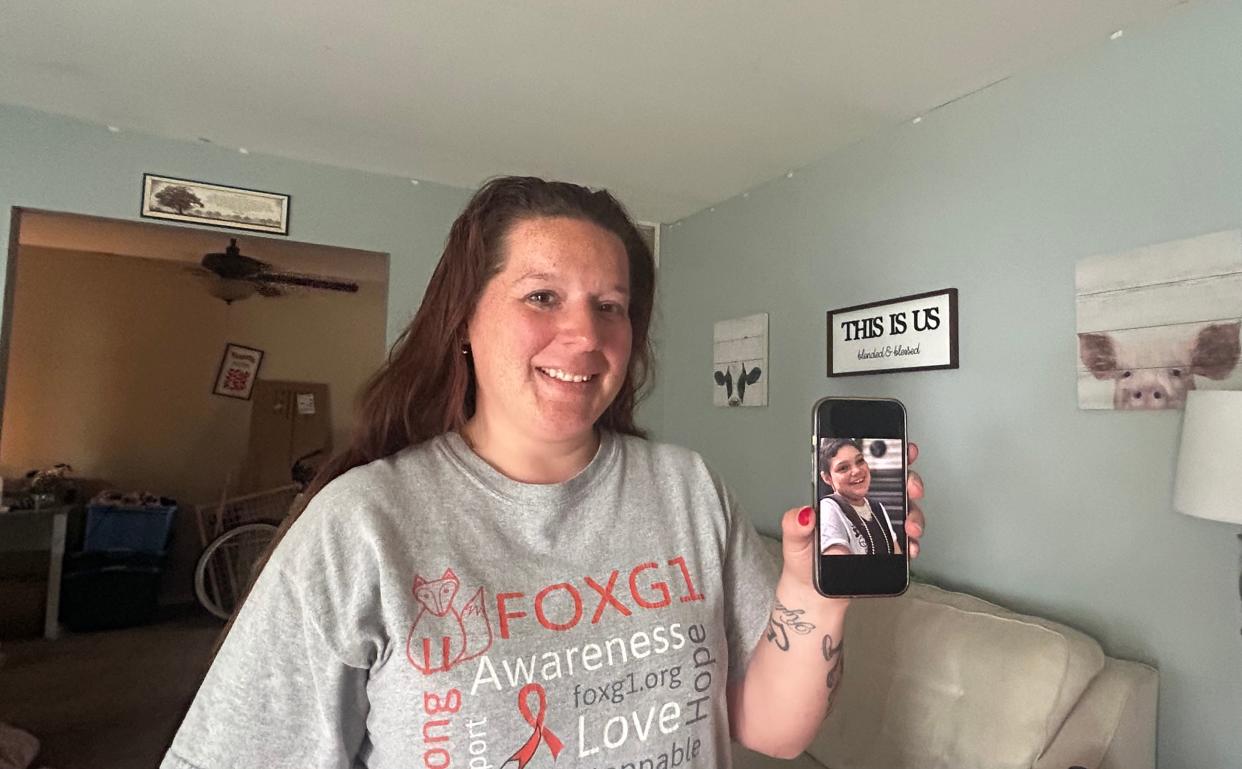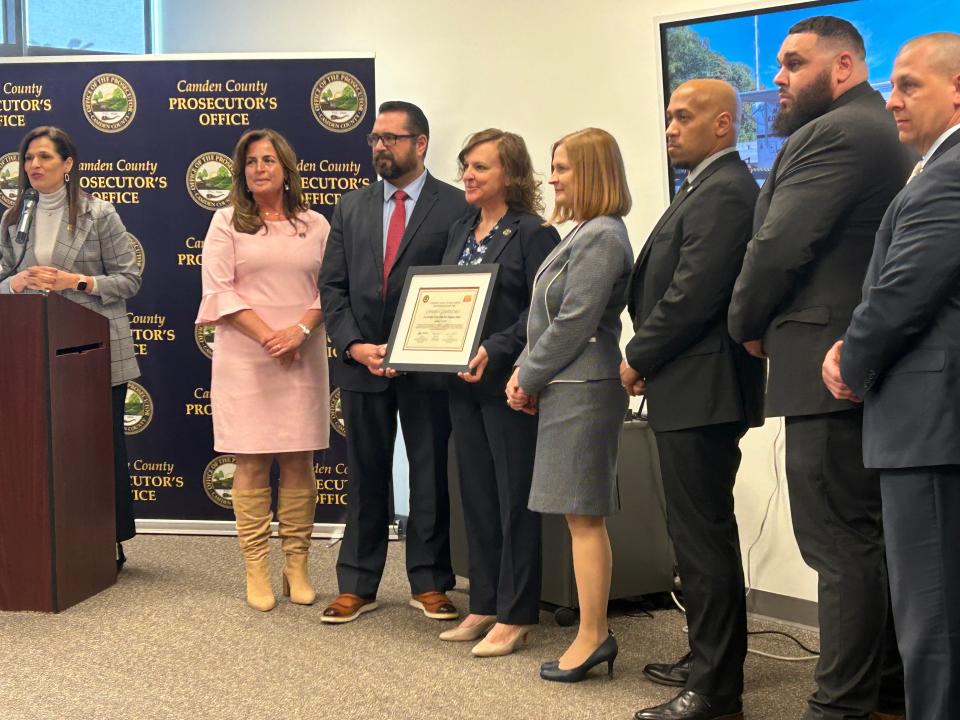Registry a relief for loved ones of those with special needs in Camden County

GLOUCESTER CITY — Alesa Lacovara's biggest fears center around not being there when her children need her.
But the oldest of her three kids, 13-year-old Riley, needs her most. Riley has FOXG1 syndrome, a genetic neurodevelopmental condition that means she's non-verbal, requires a feeding tube for much of her nutrition, and has difficulty getting around on her own.
Lacovara remembered a time when Riley didn't arrive home from her Westville school at her usual time.
"I was getting nervous," said the stay-at-home mom.
In case you missed it: Shisler Strong: Community says goodbye to fallen Deptford officer
"'Where's my kid? Where's Riley?'" she recalled asking herself, keeping an eye out for the bus that takes Riley from her Gloucester City home to Archbishop Damiano School. "Then a cop came down the street and I really started to worry."
The officer saw Lacovara and asked, "Are you Riley's mom?" and her heart raced.
It was nothing serious: The bus carrying Riley had sideswiped a parked vehicle just down the street, but for Lacovara, it drove home how many things can go wrong ― and how important it is for police and first responders to know about Riley, her challenges, her needs and how to keep her safe.
Special Needs Registry: One form, several Camden County agencies
The Camden County Prosecutor's Office recently launched a Special Needs Registry for families like Riley's: A voluntary way for loved ones to inform law enforcement officers about people whose needs are different than most.
The online registry lists a number of conditions, including Alzheimer's and dementia, autism, hearing impairment, mobility issues, post-traumatic stress disorder, intellectual/developmental disabilities and mental illness. Loved ones can inform responders about life-threatening conditions; triggers for people with autism, PTSD or mental illness; calming and soothing tactics; whether or not the person is verbal or can respond to commands; and places they might frequent, all in addition to the usual physical identifiers and emergency contact information.
Helping the hungry: Collingswood Farmer's Market to take SNAP, addressing food equity and access in suburbs
The information goes to Camden County's central dispatch system, used by all but two municipalities (Cherry Hill and Gloucester Township; though residents in both municipalities can use the registry), so if a call comes in for that address, dispatchers can inform responders about the situation before they go to the call.
Who can the Special Needs Registry help?
Lt. Fawn Landay of the Camden County Prosecutor's Office said the registry can be helpful in a number of ways.
An elderly person with dementia might wander off to visit a former address or a late spouse's grave, for example, so if they're reported missing, police have ideas about where to look first. A person with autism may not respond to verbal commands, or may be triggered by yelling. If police know in advance how to calm a person who is agitated, they can de-escalate a tense situation by using coping methods that family members suggest in advance. Someone who is diabetic may act erratically if their blood sugar dips — and police will know that behavior is due to physiology, not intoxication or belligerence.
It's part of an evolving way of thinking about law enforcement, she said.
The drug epidemic: The race against tranq: ‘If you’re not dying, you’re losing limbs’
"You're going into people's houses during a frightening moment," Landay acknowledged. "And it can be difficult to assess everything in that situation within 30 seconds. So whatever we know in advance helps us understand what to look for and how to respond to certain cues."

"Especially in cases with missing people, having ability for law enforcement officers to have that information is important," said George Chopek, a former Cumberland County Prosecutor's Office detective and board president of Online Policing Solutions, which offers training and resources for law enforcement agencies, including the Camden County Prosecutor's Office.
"When you are out on the street, things can happen quickly. You have to make a lot of judgment calls," added Chopek. "Having critical information to help people leads to better outcomes for both the officers involved and the individual."
He recalled one encounter with a person who had a fascination with superheroes and wouldn't respond to officers unless they addressed him as if he were one.
"He went from being extremely difficult to being compliant — because he felt like he was helping, like a superhero would. Just imagine how an accommodation that's so simple for law enforcement can change the outcome," Chopek said.
How to use the Special Needs Registry
Landay said the Camden County Prosecutor's Office has received positive feedback on the registry, not just from the public but also from within law enforcement.
"People have told us they're happy to share information with us if it helps their loved one," she said. "We have people on our staff who have family members with special needs and we asked them to look over the form. We asked them, 'Will this make a difference for your family? Will this help you?'"
Municipal police departments appreciate the outreach as well, she added. "Most of us got into this because we want to help people; we want to do what's best for society. This helps us understand the people we're serving and gives us more tools in our toolbox to do that."
For Alesa Lacovara, it's a way for responders to connect to her daughter, who's "still a 13-year-old girl inside," one who loves Taylor Swift, who likes to be part of a conversation and make herself heard in her own ways. If there's a way to ease her fears in crisis, or to ensure her parents are contacted as quickly as possible, Lacovara wants people to know.
"Riley is her own person," Lacovara said. "I just want (responders) to know that she can't tell them what they might need to know."
To learn more about or to register a loved one on the Camden County Special Needs Registry, visit https://camdencountypros.org/community-page/41
To learn more about the National Special Needs Registry, visit https://onlinepolicingsolutions.com/snr/
Phaedra Trethan has been a reporter and editor in South Jersey since 2007 and has called the region home since 1971. Contact her at ptrethan@gannettnj.com, on Twitter @wordsbyPhaedra, or by phone at 856.486-2417.
Support local journalism with a digital subscription.
This article originally appeared on Cherry Hill Courier-Post: Registry a relief for loved ones of those with special needs

